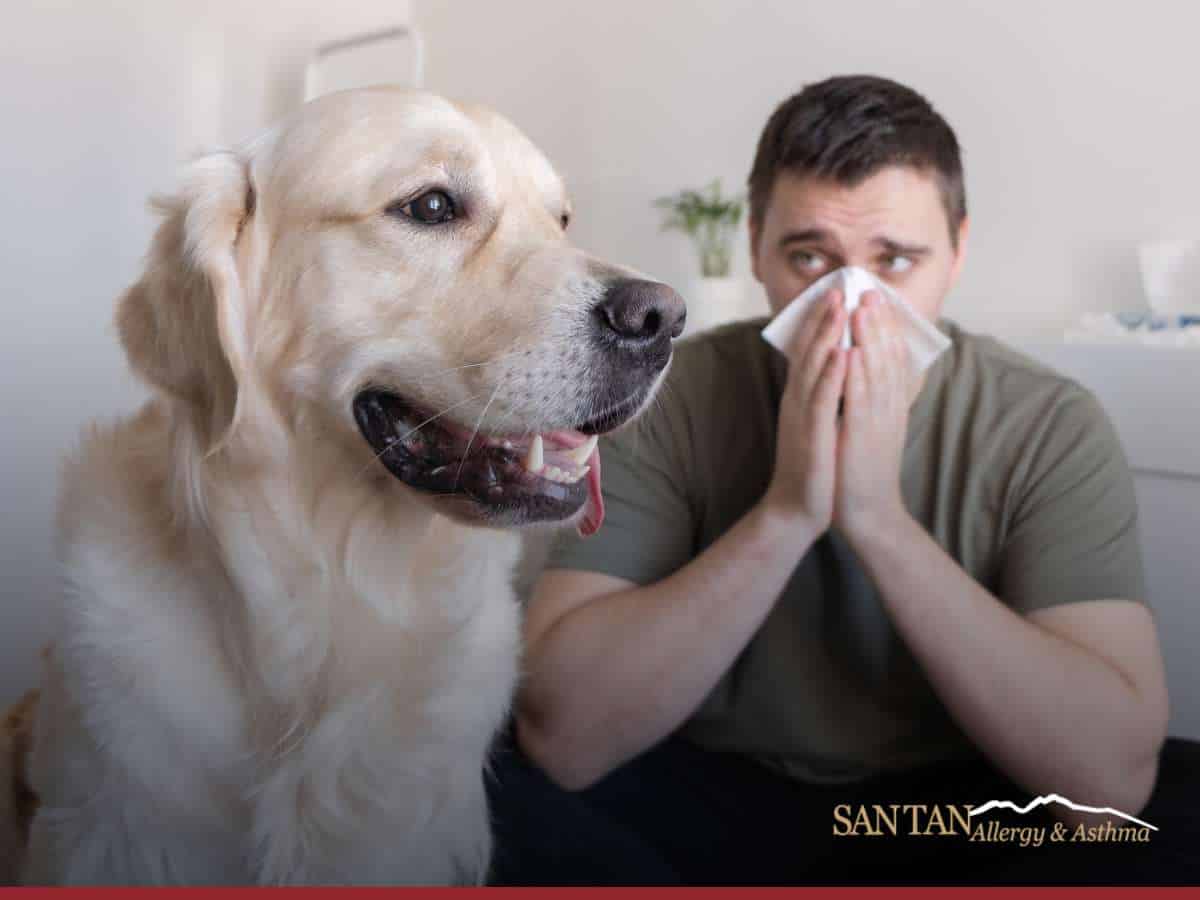Dog Allergies: Symptoms, Causes & Natural Remedies
Living in a dog-loving country can be tough when you’re dealing with dog allergies. You might adore dogs, but constant sneezing, itching, or congestion can make it hard to be around them. You don’t want to visit Chandler allergy doctors all the time, so you prefer to keep dogs at a distance.
Sadly, about 66% of American households have a dog. Therefore, you may have more than one friend who has a furry friend in their house. Dog dander is almost everywhere, even where dogs never set a paw. Detectable levels of pet dander are almost in every home in the U.S.
So, what can you do with your dog’s allergies? And most importantly, how can you know if you are allergic to dogs? Check the answers below.

Common Symptoms Of Dog Allergies You Should Know
Dog allergies are more common than you might think. According to the AAAAI, approximately 10% of Americans show allergic sensitization to dogs. The way these allergies manifest can vary from person to person. Some experience only mild discomfort, while others have reactions that interfere with daily life. The most common symptoms include:
- Sneezing and nasal congestion: Your body reacts to allergens in the air, causing inflammation in the nasal passages.
- Runny or itchy nose: This is your immune system’s way of trying to flush out the allergen.
- Itchy, watery eyes: The eyes become irritated as they come into contact with airborne dander or saliva particles.
- Wheezing or coughing: Allergens can irritate the respiratory tract, leading to shortness of breath or coughing fits.
- Skin irritation, hives, or redness after contact with a dog: Direct contact can trigger localized allergic reactions on sensitive skin.
Dog allergies aren’t usually dangerous on their own. In fact, many people live with them without realizing it, often mistaking their symptoms for seasonal allergies. However, in more severe cases, exposure to dog dander or saliva can trigger respiratory flare-ups, which can become serious without the right treatment for asthma.
Why Do Dogs Trigger Allergic Reactions?
Contrary to popular belief, it isn’t a dog’s hair that causes the issue. The real culprits are proteins found in a dog’s saliva, urine, and especially their dander. These proteins are lightweight and sticky, which means they can linger in the air and attach themselves to household surfaces.
When someone with an overactive immune system encounters these proteins, their body mistakenly treats them as harmful invaders. The immune system releases histamines in response, leading to inflammation and the uncomfortable symptoms associated with allergies.
It’s also worth noting that no specific breed is truly “hypoallergenic.” While some breeds may shed less or produce fewer allergens, any dog has the potential to trigger symptoms depending on your sensitivity.
How To Know If You Are Allergic To Dogs
You may suspect that dogs are the source of your discomfort, but assumptions can be misleading. Some people believe they are allergic to pets, only to later discover that pollen or dust mites are the real issue. That’s why it’s important to undergo a professional evaluation.
An allergy test is one of the most reliable ways to confirm whether dogs are the source of your reactions. These tests may include:
- Skin prick testing: A small amount of allergen is introduced under the skin to observe reactions.
- Blood tests: Used to detect the presence of specific antibodies that indicate an allergic response.
In some cases, your doctor may also suggest lifestyle trials, such as avoiding dog exposure for a set period, to see if symptoms improve.
Effective Medical Treatments For Dog Allergies
If lifestyle changes aren’t enough, consulting an allergy specialist can help you find the right dog allergy treatment for your symptoms. Treatment options may include:
Antihistamines
These medications work by blocking histamines, chemicals that cause allergy symptoms. They can help reduce sneezing, itching, and a runny nose. Options like loratadine or cetirizine are effective and often available over the counter. However, some may cause drowsiness, so it’s important to choose the right one for your needs.
Nasal Corticosteroids
Nasal corticosteroid sprays, such as fluticasone, are specifically designed to reduce inflammation in the nasal passages. This helps make breathing much easier and eases persistent congestion. They tend to work best with regular use, although it may take a few days before you notice significant improvement.
Immunotherapy (Allergy Shots)
For some people, allergy shots can offer long-term relief. This treatment gradually exposes the body to small amounts of allergens, helping build tolerance over time. Although results vary, many patients experience lasting improvement and are able to reduce or even stop other allergy medications altogether.
Decongestants
Decongestants can be useful for quick allergy relief, as they reduce swelling in nasal tissues. They are available in both oral and nasal spray forms. While effective for short-term use, it’s important not to rely on them for long periods, because overuse can lead to rebound congestion and other side effects.
How To Cope If You Have A Dog At Home
No, you don’t need to give up your pet. If you already have a dog and discover that you’re allergic, you can take these precautions:
- Keep your dog out of the bedroom and off upholstered furniture: Limiting your pet’s access to certain areas, especially where you sleep, gives your body a break from allergen exposure.
- Wash your hands after playing with or petting your dog: This simple habit helps prevent allergens from spreading to your face or eyes, where reactions are more likely to occur.
- Use HEPA air purifiers in main living areas: These devices help trap dander and other airborne particles, keeping indoor air cleaner and reducing allergy flare-ups.
- Clean and groom your pet regularly: Bathing your dog with vet-approved shampoos and brushing its coat outdoors can significantly cut down on dander inside your home.
The key is finding balance. You can maintain the same bond you have with your pet without affecting their quality of life, while also protecting your own health. Sometimes, small changes can lead to big improvements. Don’t get used to the uncomfortable symptoms of allergies without trying these steps first!
When To See A Doctor
If you experience persistent symptoms that affect your daily life, or if you notice breathing difficulties, it’s important to consult with allergy doctors. Chronic exposure without treatment can worsen conditions over time and, in some cases, lead to complications like asthma.
Professional care ensures you receive a personalized plan, whether it involves medication, testing, or advanced therapies.
Preventing Severe Reactions
Even if your allergies are mild, it’s essential to remain proactive. Taking preventive steps can reduce the risk of developing more serious conditions. Here are a few things to keep in mind:
- Don’t delay seeing an allergy specialist if symptoms worsen.
- Keep track of when and where your symptoms flare up. It may help identify additional triggers!
- Always follow your doctor’s treatment plan, even if you start feeling better.
Remember, what starts as mild sneezing can sometimes progress into more severe respiratory complications if ignored.
Living Better With Dog Allergies
Discovering that you have a dog allergy shouldn’t be seen as bad news. In fact, it means you’ve found the cause of your symptoms. Once you have the answer, you can start making the necessary adjustments to your life to minimize discomfort and significantly improve your quality of life.
If you suspect you have a dog allergy due to symptoms affecting your health, it’s important to get tested by qualified allergists in Gilbert. At San Tan Allergy & Asthma, we can help you begin a treatment plan to relieve your symptoms. Schedule your appointment now!

San Tan Allergy & Asthma
4915 E Baseline Rd #112
Gilbert, AZ 85234
Phone: 480-626-6600
Email: officemanager@santanallergy.com
Website: https://santanallergy.com/







